Exclusive Book Excerpt | February 19, 2025
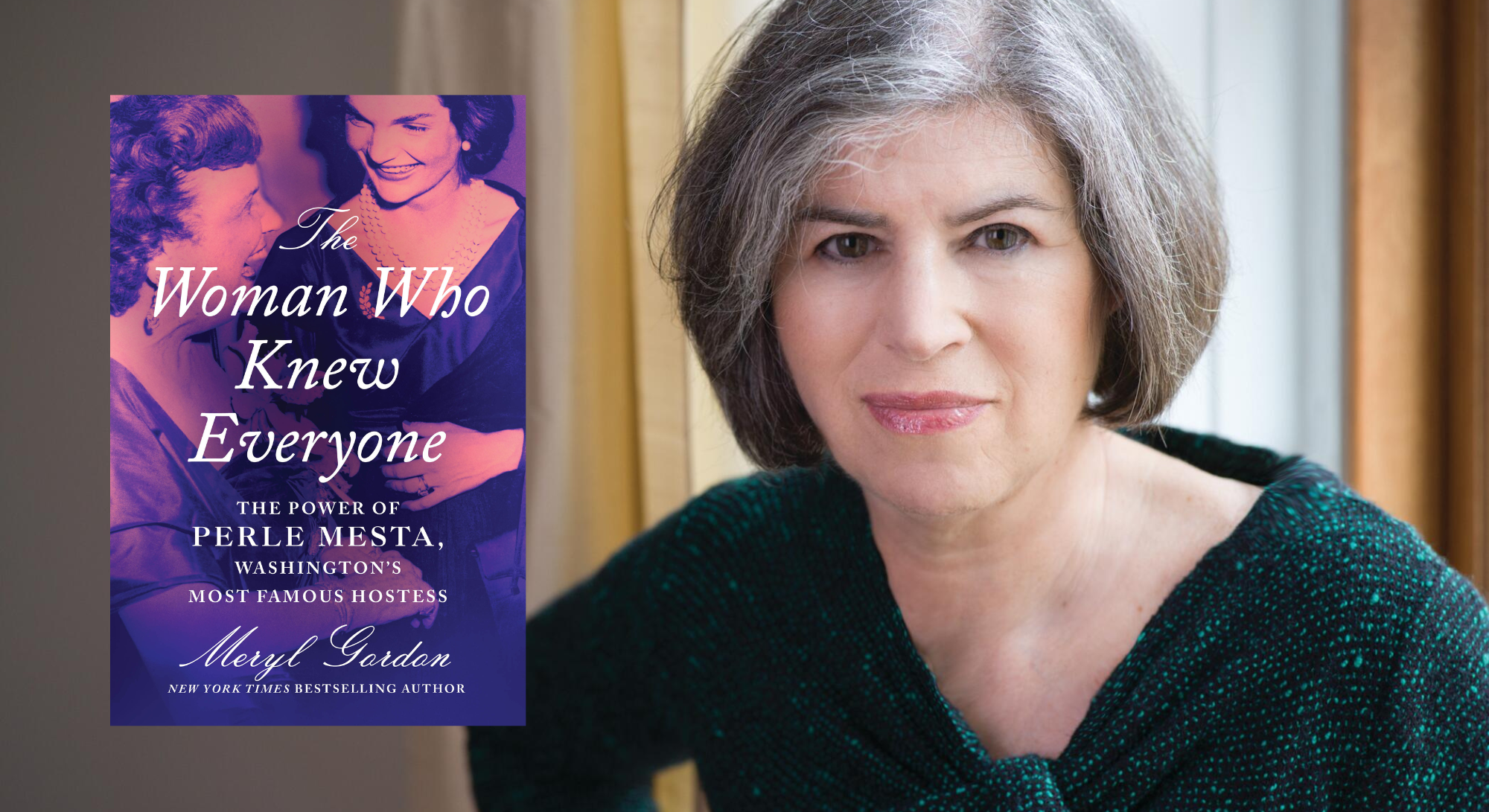
Exclusive book excerpt from Meryl Gordon’s latest triumph
The Woman Who Knew Everyone: The Power of Perle Mesta, Washington’s Most Famous Hostess
Perle Mesta was a force to be reckoned with. In her heyday, this wealthy globe-trotting Washington widow was one of the most famous women in America, garnering as much media attention as Eleanor Roosevelt. Renowned for her world-class parties featuring politicians and celebrities, she was a regular at the White House for four decades and had very close ties to three presidents—Harry Truman, Dwight Eisenhower and Lyndon Johnson.
⇒ Book Event March 4, 2025 — Register Today!
A pioneering supporter of the Equal Rights Amendment, she was a prodigious Democratic fundraiser and rescued Harry Truman’s financially flailing 1948 campaign. In return, he named Perle as envoy to Luxembourg, only the third woman in American history to hold a diplomatic post.
In her intensely researched biography, author Meryl Gordon chronicles Perle’s lavish life and society adventures in Newport, Manhattan and Washington, while highlighting her important, but nearly forgotten contribution to American politics and the feminist movement.
TRU EXCLUSIVE BOOK EXCERPT
EVEN IN WARTIME, Perle trekked to the offices of congressmen and senators to win backers for the Equal Rights Amendment. The prospects were dim. As Senator James Hughes, a Maryland Democrat, told the National Woman’s Party’s annual convention: “In this disturbed time, you can’t get things done as you could in previous years. Let me warn you that the opposition is just as bitter as it ever was.”
As part of her charm offensive, she got to know powerful House Speaker Sam Rayburn. Short and balding with a ferocious temper, the Texan opposed the ERA but became fond of the energetic feminist, nicknaming her Perly-Whirly. The shy, divorced legislator rarely went out at night, but if summoned by Perle, he accepted.
Rayburn introduced Perle to his protégée, Texas congressman Lyndon Baines Johnson. Perle liked launching newcomers and as she began to do more entertaining, she included the Johnsons. As Luci Baines Johnson, the couple’s daughter, recalled, “She thought my father was competent and worthy of her time and attention and tutelage.” Her parents, she added, “had a great sense of respect and appreciation for the doors she had opened.”
As Perle walked the halls of Congress in search of allies, she was gratified to receive a sympathetic reaction from Missouri senator Harry Truman, who told her he supported the ERA. “I walked right into his office and found he was for it,” she later recalled. “He’s always for women, he’s a wonderful, wonderful man.”
♦ ♦ ♦
THE TWO OF THEM hit it off. Truman had grown up on a farm in precarious finances, served in the Army in World War I, and overcame daunting obstacles to make it to Congress. He was elected to the Senate in 1934. The highly respected Missouri senator and Perle were born two years apart—Perle in 1882, Harry in 1884—and both grew up in the heartland. Neither attended college, and both were often underestimated. Financially, they were worlds apart. Truman, and his wife Bess, and their beloved daughter Margaret struggled on his government salary.
Perle was jubilant when Harry Truman agreed to write a letter supporting the ERA. So many male officials gave her the runaround, but Truman seemed genuinely interested and believed what she was doing was important. Perle championed Harry Truman from then on at every opportunity.
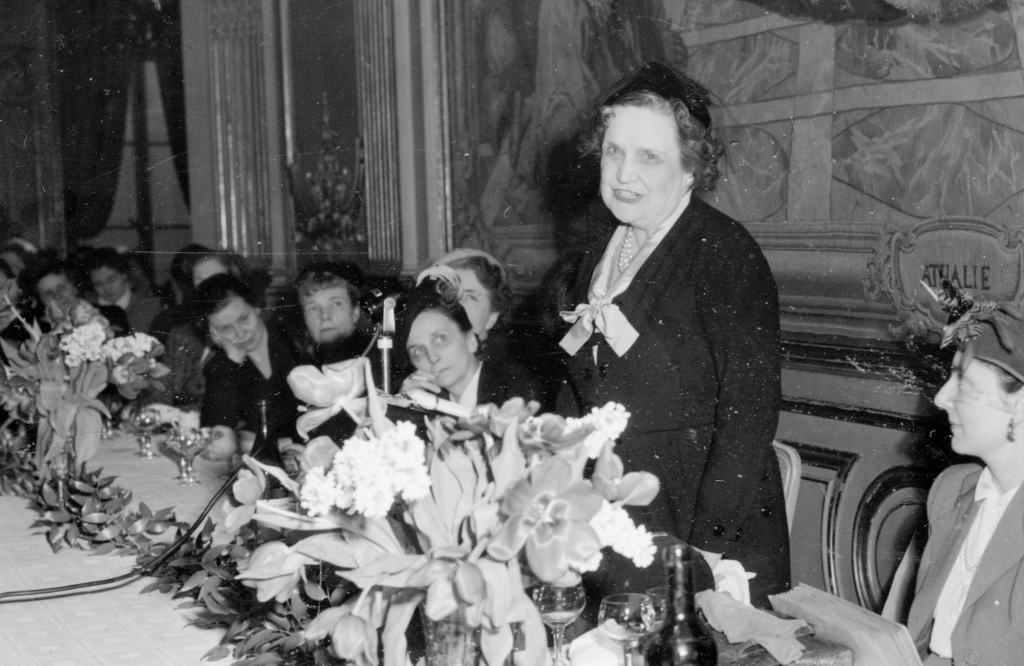
Perle Mesta speaking at Club Interallie
IN THE SUMMER of 1944, Perle attended the Democratic presidential convention in Chicago, hoping to replicate her victory at the 1940 GOP convention by convincing the Democrats to support the Equal Rights Amendment. Despite opposition from First Lady Eleanor Roosevelt, Perle and her National Woman’s Party colleagues prevailed. By a narrow vote of 43 to 42, the platform committee recommended the ERA.
With that mission accomplished, Perle, an Arizona delegate, turned her persuasive skills to backing Harry Truman as Roosevelt’s vice president. FDR’s advisers had been pressing him to replace current vice president Henry Wallace, fearing the popular politician’s quirky interests (astrology, vegetarian diet, references to Karl Marx) would drag down the Democratic ticket.
FDR gave conflicting signals, eventually stating he didn’t want to dictate to the convention and nominally leaving the choice up to the delegates, even through he privately signaled his support for Truman. Henry Wallace was determined to keep his job.
An all-night fight ensured as supporters of Wallace and Truman wrangled for votes. Perle argued in favor of Truman, recalling, “I went to the mat for him for vice president.” Emotions ran hot as Henry Wallace won the first ballot by 429 ½ to Truman’s 319 ½ votes. The winner needed 589 votes. Then big-city mayors and the party’s political kingmakers coalesced behind Truman. On the second ballot, the Missouri senator won by a huge margin: 1,100 to 66 votes. Perle was elated that “my man for the job” won.
On November 7, Roosevelt and Truman defeated the GOP challengers, New York governor Thomas Dewey and his running mate, California governor Earl Warren, by nearly 3.6 million votes.
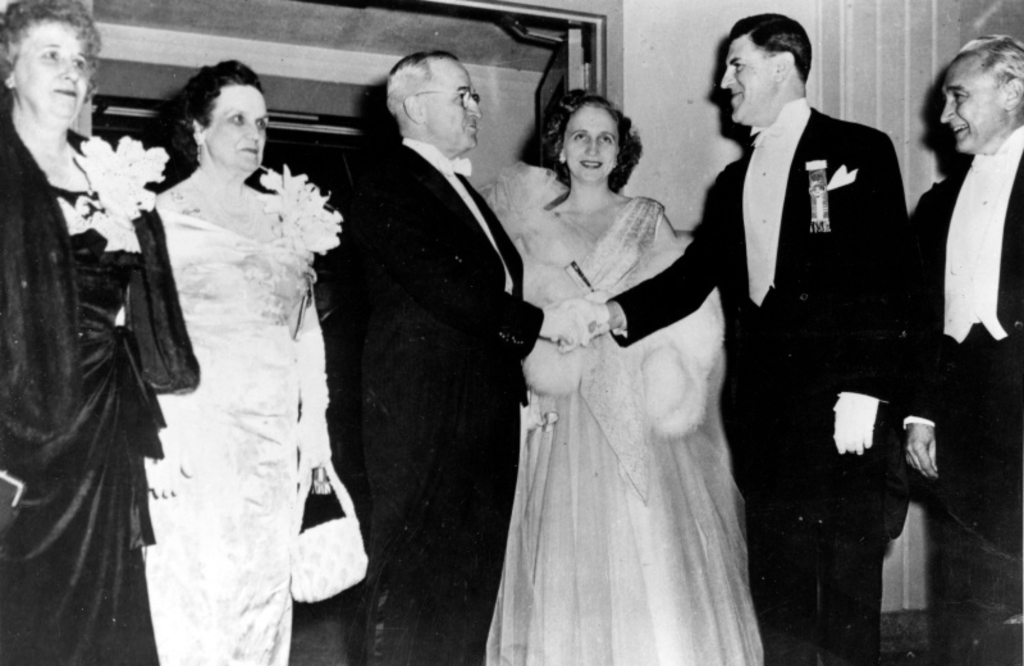
L to R: Bess Wallace Truman, Perle Mesta, President Harry S. Truman, Margaret Truman and two unidentified men (TrumanLibrary.gov)
EAGER TO CELEBRATE Truman and his new job, Perle sent out ninety invitations for a party in his honor on March 8 at the Sulgrave Club. She fussed over every detail from the flowers (a rare shade of pink tulips) to the entertainment (New York ventriloquist Al Robinson with his dummy, Alkali Ike) to her guest list (which included ubiquitous House majority leader Sam Rayburn, Republican Senate minority leader Joe Martin, and Supreme Court justice William Douglas)….
A week before Perle’s party, the capital was rocked by stories implying the president was physically failing. On March 1, FDR looked frail when he spoke to Congress about his pivotal meeting in Yalta with Prime Minister Winston Churchill and Soviet premier Joseph Stalin. “I was not ill for a second until I arrived back in Washington and there heard the rumors about my health,” Roosevelt quipped, trying to downplay concerns. But there was widespread fear his time was running out.
The morning of Perle’s party, the newspapers delivered grim news. Soldiers injured overseas were arriving in the US at a rate of 1,200 per day. In Guam, Japanese forces were engaged in bloody hand-to-hand combat with Americans. Official Washington needed a dose of good cheer, and Perle was ready to provide it.
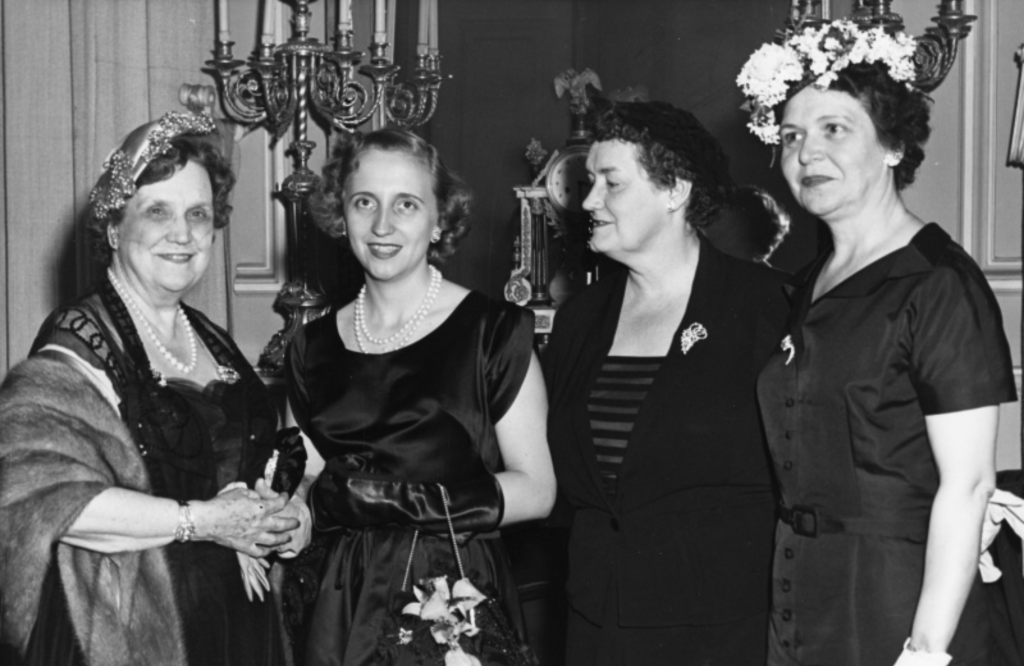
L to R: Perle Mesta; Margaret Truman (during a trip to Brussels); India Edwards, vice chair of the Democratic National Committee; and Georgia Clark, treasurer of the United States (TrumanLibrary.gov)
Stationing herself at the top of the Sulgrave’s second-floor staircase, with Harry and Bess Truman by her side, she welcomed guests. Up they trooped, the notables and quotables, witnessing Perle’s biggest social triumph. After Sidney’s orchestra performed, after the ventriloquist made fun of Rayburn’s balding pate, after sincere and humorous champagne toasts, no one wanted the night to end. So the guests began to perform. Kentucky senator Happy Chandler sang “My Old Kentucky Home”; Oklahoma-born diplomat Patrick Hurley, raised on an Indian reservation, gave Indian war whoops; and Rosa Ponselle sang Franz Schubert’s “Ave Maria.”
Rosa convinced Harry Truman to be her accompanist. Once he sat down at the piano, she climbed up on it and assumed a seductive torch-singer pose, to the oohs and aahs of the guests. The cheerful vice president went on to play a solo of Ignacy Jan Paderewski’s Minuet in G.
Perle had been giving parties in Washington since 1917, but this evening put her on the map. The newspapers went wild. “It was a shindig to rival any given this season. Celebrities, fun, food and liquor were unrationed,” wrote the Associated Press in an emblematic story. “Mrs. George Mesta, the Oklahoma oil heiress has a wardrobe of diamonds, of beautiful furs, a sense of humor and a superb knack for entertaining.”
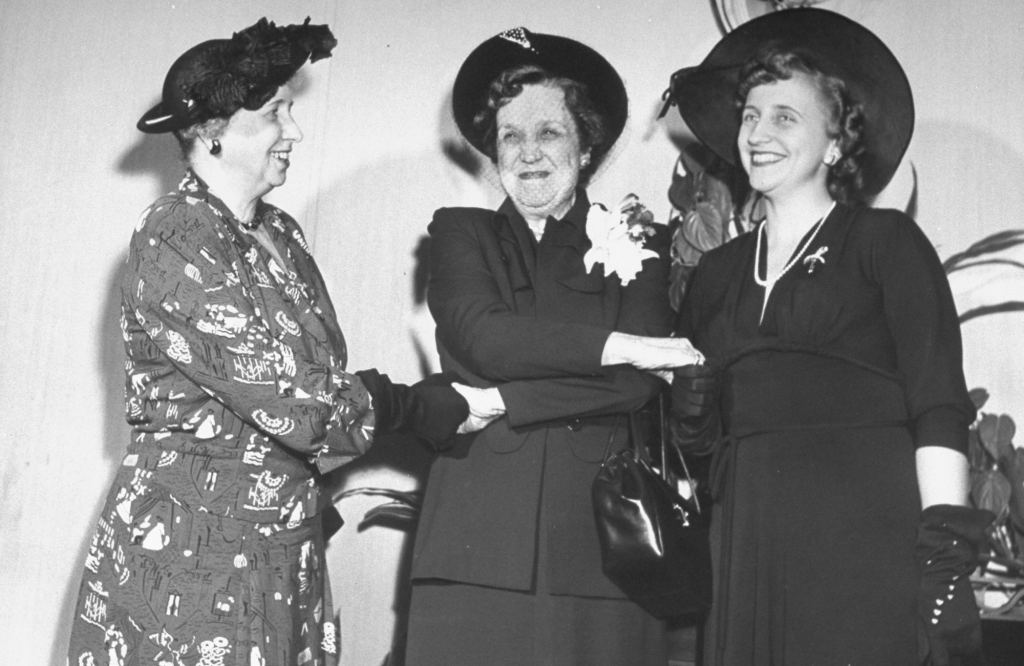
Perle Mesta shaking hands, Truman-style, with Bess and Margaret Truman as she leaves on the S.S. America enroute to Luxembourg, where she served as U. S. Ambassador (TrumanLibrary.gov)
The following day, Perle took starstruck Margaret Truman to lunch with Rosa Ponselle at the Mayflower. The Metropolitan Opera star graciously then hosted Margaret and Perle at her Baltimore estate and brought her vocal coach to listen to Margaret sing. The Truman parents were very, very grateful. Still adjusting to their new status, the vice president and his wife were being feted in capital homes almost every night. They were still living in a two-bedroom apartment with Bess Truman’s mother, with a listed phone number. They had a pleasant day-to-day life, until everything abruptly changed [on April 12, 1945].
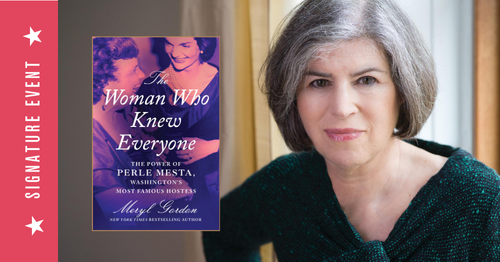
REGISTER FOR THIS EVENT
March 4, 2025: “The Woman Who Knew Everyone” featuring NYT bestselling author Meryl Gordon
Join our email list to receive digital history, Museum updates and program alerts:

